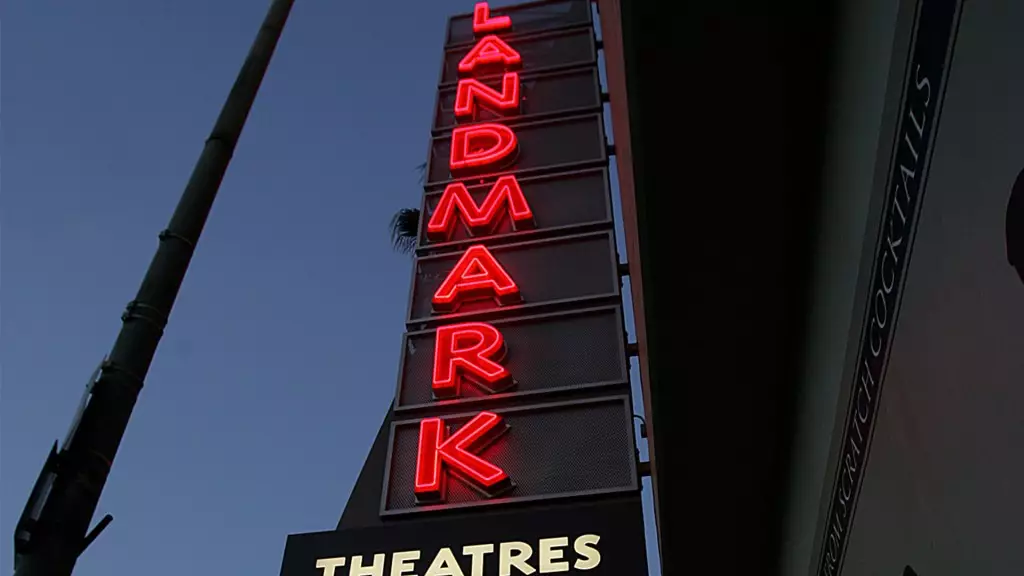The dramatic decline of Landmark Theatres, once a revered name in the independent cinema circuit, emphasizes the volatility of the entertainment industry, especially in the post-pandemic landscape. The recent disclosures from Charles Cohen, the owner of Landmark, paint a grim picture of the theatre chain’s finances, revealing impacts from COVID-19, exorbitant interest rates, and disruptions stemming from Hollywood strikes. During a deposition made in May as part of ongoing litigation with lender Fortress Credit Corp, Cohen reported staggering losses, which were enough to plunge the company’s value by hundreds of millions of dollars.
These revelations, unearthed in a case before the New York State Supreme Court, indicate that Landmark may soon face an auction of its properties to satisfy a defaulted loan. The implications of these proceedings extend beyond mere financial loss; they speak to broader trends affecting the cinema industry where changing consumer habits, economic fluctuations, and unprecedented interruptions have significantly altered the landscape.
The legal battle intensifies as the judge presiding over the case affirmed that Cohen defaulted on his obligations, leading to a mandated auction of Landmark’s properties, including its well-known theatres. In addition, Cohen faces liability concerning a personal loan guarantee amounting to $187 million, contingent on the public sale expected to occur on November 8 unless a settlement is reached. The situation creates a pressing timeline, positioning Cohen in a precarious state as he navigates the sale of his company’s substantial assets.
In recent filings, Fortress Credit Corp has vigorously attempted to showcase the financial deterioration of the properties slated for auction, indicating that the anticipated revenues will likely fall short of the debts owed. There is an urgency for Fortress to recover its assets, resulting in motions to prevent Cohen from transferring personal assets that could evade creditors, showcasing a high-stakes game of financial chess.
Questionable Asset Transfers
Complicating matters, Fortress claims that Cohen has engaged in asset transfers exceeding $70 million since the initiation of the lawsuit, purportedly to safeguard these assets from potential forfeiture. Notably, he reportedly transferred a high-value home in Greenwich, Connecticut, and multiple luxury boats into newly formed ownership structures. These actions raise ethical queries regarding asset protection strategies during bankruptcy or financial distress and ignite discussions around the responsibilities of business owners during financial downfalls.
Cohen’s attempts to shield his wealth seem to contrast sharply with the harsh realities faced by Landmark’s operation. The luxurious nature of the assets he is reportedly offloading highlights the vast disparity between the high-end lifestyle of company executives and the financial realities of the businesses they manage.
The plight of Landmark WTheatres reflects more than a singular company’s misfortune; it signifies a shift in the cinematic landscape influenced by societal changes. The pandemic’s closure of theatres and an extended period of labor disputes in Hollywood—affecting both writing and acting—has stunted production and exacerbated financial woes across the industry. Cohen admitted during deposition that Landmark was suffering from significant operational challenges, entailing drops in revenue due to an audience that has yet to fully reintegrate into the theatre experience. The situation raises important questions about the survival of arthouse cinemas, which rely on juxtaposing independent films amid a sea of blockbuster releases.
The recent closure of Landmark’s flagship theatre in Westside LA served as a stark indication of the diminishing attendance and shifting focus within the industry towards a younger demographic coupled with innovative marketing strategies. The traditional model of theatrical releases faces disruption, inviting questions about the long-term viability of such venues. Other cinema chains like Alamo Drafthouse are pivoting to capture diverse audiences, underscoring the need for a creative approach to survive in this altered environment.
As Landmark Theatres limps toward its auction date, the future remains uncertain. Charles Cohen expresses hope for a settlement, believing in the possibility of restructuring or salvaging operations, yet the proximity of the auction looms large. As the industry witnesses transformations fueled by societal shifts and unforeseen events, Landmark’s journey encapsulates the broader challenges faced by many cinema operators in an evolving marketplace.
The fate of Landmark will serve as a telling case study, offering invaluable lessons about resilience, adaptation, and the necessity for innovation in a world where the entertainment landscape has dramatically shifted. Ultimately, the challenges faced by Landmark highlight not only the financial strains within the industry but also the importance of foresight and flexibility in navigating unpredictable terrains, ensuring businesses can thrive despite adversity.
